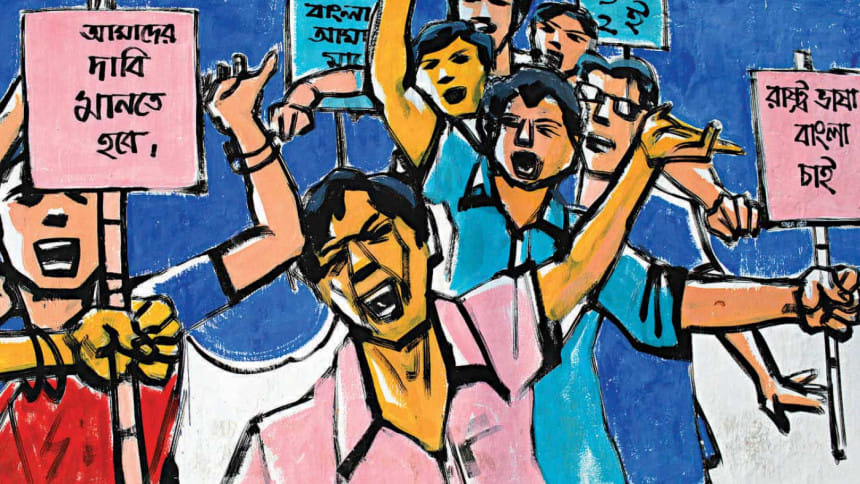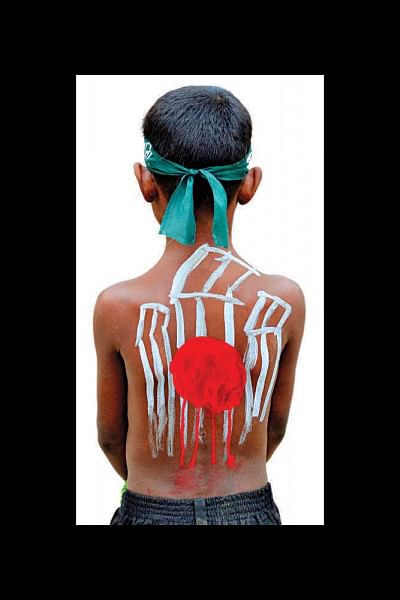HOW A LANGUAGE DIES

February 21 marks an important day – a date marked by blood and tears of those who stood steadfast as their voices were on the verge of being silenced. Why is it that some languages become dominant, while others are left to die? Why is it that since our first words of 'ma' or 'baba' until the silence of our last breaths, language comes to play a crucial role in who we are? On the occasion of International Mother Language Day, these are crucial questions for everyone to ponder upon.
Before answering these questions, we must look at the harsh reality. Most linguists predict that by the year 2100, 90 percent of the world's languages would become extinct. In a largely globalized world, this reality is apparent, especially with the dominance of English at all levels of life. At our national level, Bangla is the dominating language. Small communities, often with no option but to compete in the global market, must learn the dominant languages – and sometimes forfeit their mother tongue. This leaves many languages vulnerable to becoming extinct.
Languages become endangered for many reasons – starting from colonisation, wars, and genocide to globalisation. Languages are considered to be endangered when the number of speakers or the number of people claiming it as their own deplete and also when it loses relevance and prominence in the social and cultural spheres.
In Bangladesh, there are several languages, belonging to ethnic minorities that are considered to be threatened right now: Chak (Sak), Asho Chin, Pangkhua, Megam, Bawm, Atong, Khasi, Kurux and Mizo. Although we all live within the same geographical boundary as people who identify these languages as their native tongue, we rarely give thought to the fact that many of these languages will disappear right under our noses even though we strongly talk about the importance of mother tongues.

Some may ask, why we should care that these languages are dying, as long as we have 'some' medium to communicate. Take note: language not only shapes the way we think but also the way we see, feel and experience the world around us. In many ways, language and ethnicity are virtually tied to each other. Eventually, language becomes an expression of our identity – of every nook and cranny that we call the 'self.' When we lose a language, we lose a cultural heritage, the special ways different people express their relationships, their families, and the world that they see. In the sweep of modernisation and a dominant global language, if people start to think of their language as useless, they start to see their identities in the same way as well. The solemn events of 1952 ring a bell here again. This is why people cling so dearly to language.

Despite this, classrooms in many parts of Bangladesh where the population consists of ethnic minorities, children are forced to learn in languages that they do not speak at home or often fully understand. Imagine going to a school where they conduct the lectures in Khasi only. Would you come back having learnt anything? While we do pick up second languages while being educated in our schools, how would it be if our first language itself is never used? It then becomes important to promote inclusion and to enhance chances of students from marginalised groups to learn what they consider their 'mother tongue' as well.
Not all is lost. Languages can be revived in many ways, some meticulous and some simple. Hebrew, for example, was brought back from extinction. There are also many ways in which we can accommodate more languages and help fill the communication gaps and reduce the social impacts. Globalisation may have given us a hoard of problems but it's also helped us find digital tools that can help us save languages, especially with Unicode, which International Mother Language Institute has already taken initiatives in. Integration of other languages within the political and educational domains would also prevent languages from becoming vulnerable. On a daily basis, we communicate in several
languages, but by giving them official status, we could create more impact. We often forget that giving other languages recognition doesn't lessen the importance that both Bangla and English would have in our daily lives – it just gives back the right we highlight on every Ekushey February.
Depriving people of their language has been a systematic way of controlling and dominating the 'other' – people we consider different. We often think of difference as a bad thing, as not being able to integrate with the mainstream society, but do we leave space for people to negotiate with these differences? In preserving our own language, we must never repeat history in crushing others. In upholding the spirit of our Language Movement, we should try our best to preserve languages and people associated with them, because preserving them also means preserving our harmony and most importantly, our diversity.
--------------------------------------------------------------------------
References:
http://www.ethnologue.com/country/BD
http://www.ethnologue.com/endangered-languages
http://www.bbc.com/news/science-environment-29037168
http://news.bbc.co.uk/today/hi/today/newsid_8311000/8311069.stm
http://www.bbc.com/news/science-environment-18020636
http://www.unesco.org/new/fileadmin/MULTIMEDIA/HQ/ED/GMR/pdf/language_factsheet.pdf
http://www.unesco.org/culture/languages-atlas/index.php

 For all latest news, follow The Daily Star's Google News channel.
For all latest news, follow The Daily Star's Google News channel. 



Comments